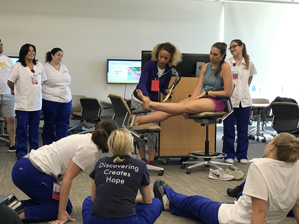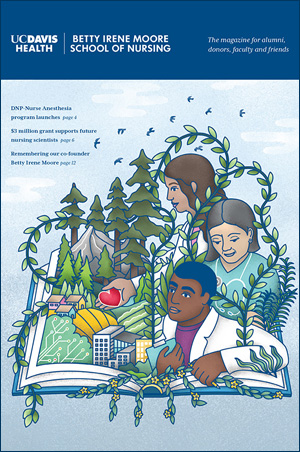Innovation in educational approaches and learning methods
Educational programs at the Betty Irene Moore School of Nursing place an emphasis on problem solving, independent thinking and individual accountability to empower students to fulfill their learning needs and prepare them to lead in health care. Faculty and students work together to create environments that promote leadership, interprofessional education, transformative research and cultural inclusiveness. Through innovative teaching and learning approaches that address a variety of learning styles, professors actively engage students.
Whether it’s future researchers and nursing faculty looking to advance their careers or nurses, nurse practitioners and physician assistants seeking greater clinical knowledge, all students at the School of Nursing benefit from professors with diverse interests who create learning environments that empower them to be agents of health care change. Many courses use the flipped classroom style of learning where students work in a way that fits their learning style to review content and come to class prepared to engage in meaningful discussions around a topic. Technology allows students to maximize learning time by completing coursework before coming to class. The elimination of lecture-style instruction engages students in a two-way flow of information.
Faculty recognize adults learn differently and instruction must accommodate multiple learning styles. New research validates that student-driven education promotes retention far better than lecturing. Ultimately, School of Nursing graduates effectively function to the highest standards of care.
Student-directed learning
 Students play an active role in their learning.
Students play an active role in their learning.
As Charles Bonwell and James Eison, authors of "Active Learning: Creating Excitement in the Classroom," describe it, “Students must do more than just listen: They must read, write, discuss or be engaged in solving problems. Most important, to be actively involved, students must engage in such higher-order thinking tasks as analysis, synthesis and evaluation.” Gone are the stage and the podium from where a professor orates and imparts noble truths. Face-to-face collaboration enables students and faculty to extract the greatest value from both academic and personal perspectives. Since students learn based upon their personal experiences, motivators and capacities, professors develop classroom and clinical lessons that enable students to apply and develop their greatest talents.
Integrative case-based learning
In addition to studying health care concepts, conditions or diagnoses, School of Nursing faculty use case scenarios of people living with real conditions that impact their health. The cases are developed so that none of the people are identifiable, yet the details of specific events in a context or situation promote an authentic learning experience. Professors incorporate family relations, regional geography, cultural competence and socio-demographic details, with the hope that students will better appreciate the impact of multiple systems on individual health and well-being.
By seeing past the chronic condition to explore the bigger picture, students acquire a unique set of knowledge, skills and attitudes that enable them to administer care effectively and lead a team of caregivers confidently and in the best interest of the entire person. These cases serve as curricular threads that decrease course isolation and facilitate learning across the curriculum. Students develop a collaborative, team-based approach to their education, and ultimately, their profession.
Simulation labs
After much research and years of teaching, faculty agree that students who have learned how to think critically make better judgments in a clinical situation than those who have merely memorized facts. The amount of knowledge required today to practice safe care goes beyond traditional, from-the-podium instruction. A well-designed simulation curriculum establishes critical thinking and clinical decision-making abilities in a learner-centered environment. Through simulation-based learning, School of Nursing graduate students experience clinical-care situations in real time without risking safety. Once they leave the simulated clinical setting, students and faculty review their actions and ask questions in a debriefing that provides a deeper understanding of the students’ roles and decisions.
Myers-Briggs Type Indicator — Personality Assessment
 Understanding personalities promotes teamwork.
Understanding personalities promotes teamwork.
Understanding the dynamics of one’s personality enables an individual to act more genuinely, work more efficiently and function effectively in a team environment. The Myers-Briggs Type Indicator (MBTI) is a trusted personality assessment used worldwide to measure psychological types and provide an understanding of different personality preferences, as well as help students enhance a team's dynamic.
The knowledge gained from the data reports promotes a greater understanding of self and others by increasing awareness of how individuals gather information, make decisions and interact with others. Students can focus on their talents and strengths while increasing their understanding of others’ differences and improve their problem-solving skills. After taking their MBTI assessment, students have their confidential results delivered to them. See more information on the Myers-Briggs Type Indicator personality assessment.





